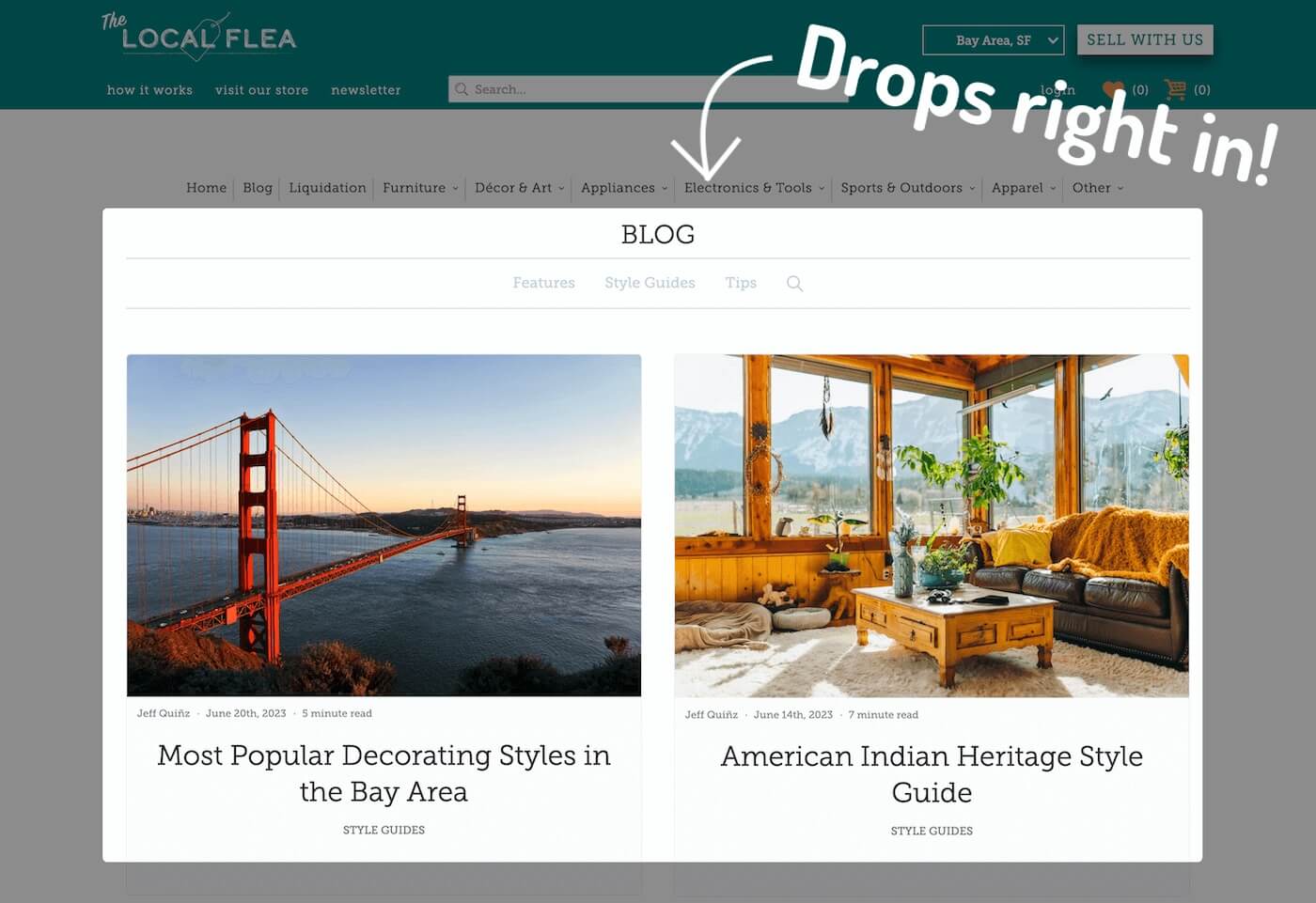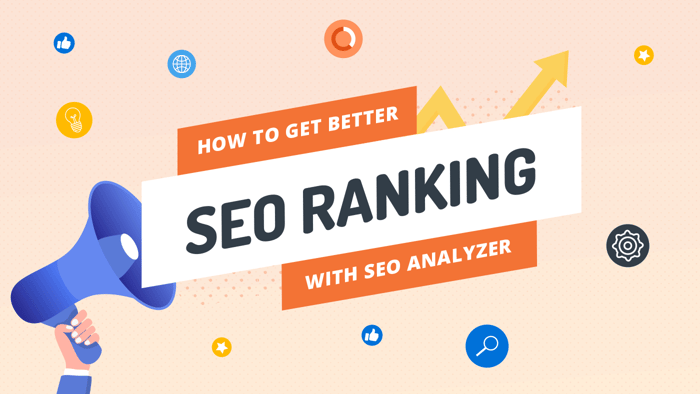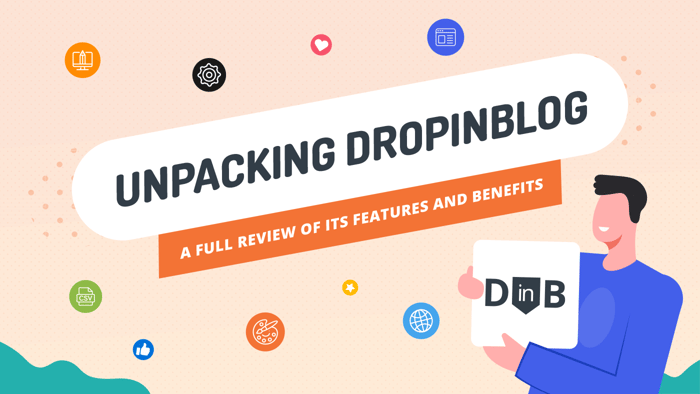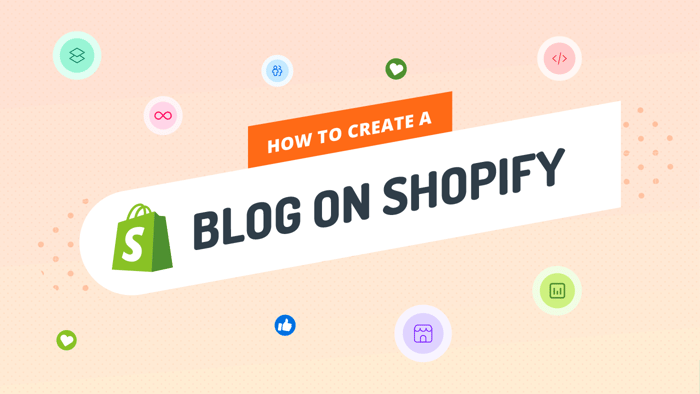Many people are familiar with Shopify, but that’s less the case with Volusion. However, Volusion is not a new e-commerce platform, and it has been through its fair share of ups and downs since its inception in 1999. While Shopify is the bigger household name, is it the better e-commerce platform? We'll break it down in this Shopify vs. Volusion comparison.
There are a multitude of e-commerce platforms available, so it's crucial to select one that aligns perfectly with your specific needs and goals. In this blog post, we'll complete an in-depth analysis to help you make an informed decision about which platform is the ideal fit for your e-commerce venture.
Whether you're a seasoned entrepreneur looking to switch platforms or a newcomer eager to launch your online store, this post will hopefully provide the insights to steer you in the right direction.
A Quick Shopify vs. Volusion Comparison:
| Shopify | Volusion | |
| Pricing |
|
|
| Site Builder and Editor |
|
|
| Features |
|
|
| Blogging |
|
|
| Integrations |
|
|
| Customer Support |
|
|
Table of Contents
Pricing
Shopify
Shopify has really done its homework and developed a range of pricing options to suit all kinds of retailers. All three standard plans give you the ability to build an online store, sell unlimited products, and sell them across multiple channels like social media platforms.
Shopify doesn’t offer a free plan. At one point, it offered the option to trial the platform for free for 14 days, but even that option is off the table now. In terms of a free trial, you now get just three days.
When it comes to transaction fees, Shopify does sting you a little. Broadly speaking, if you use the built-in Shopify Payments, there are no transaction fees. However, if you opt for a third-party payment processor, you’ll be charged 2%, 1%, or 0.5% on each sale with the Basic, Shopify, and Advanced plan respectively.
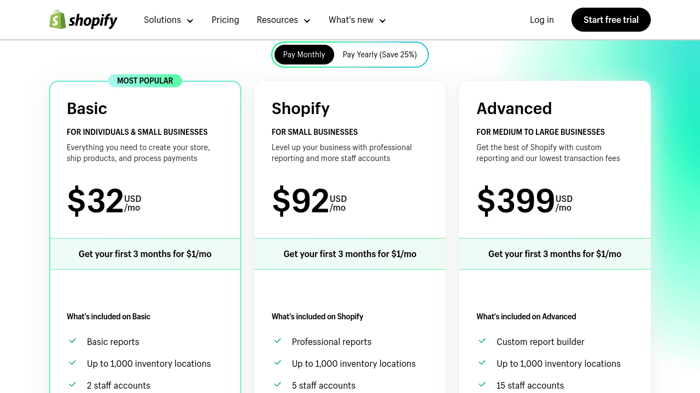
Basic Plan
The Basic plan is the starting point for most people. It costs $32/month or $288/year, which is the equivalent to $24/month. With the Basic plan, you’ll get two staff accounts and are able to do everything you need to sell and market your products, even on an international scale. It offers really good value for money.
Shopify Plan
The Shopify plan is the next level up and costs $92/month or $828/year ($69/month). This plan gives you five staff accounts as opposed to two, and improved store performance reporting, but that’s the limit to the additional features for the price increase.
Advanced Plan
The Advanced plan is definitely tailored more toward large, established e-commerce businesses. The price is quite significant, but you do get some additional features that make doing business far smoother. For $399/month or $3,588/year ($299/month) you get 15 staff accounts, advanced website performance reporting, and you can add a tax estimate at the checkout.
Additional Pricing Options
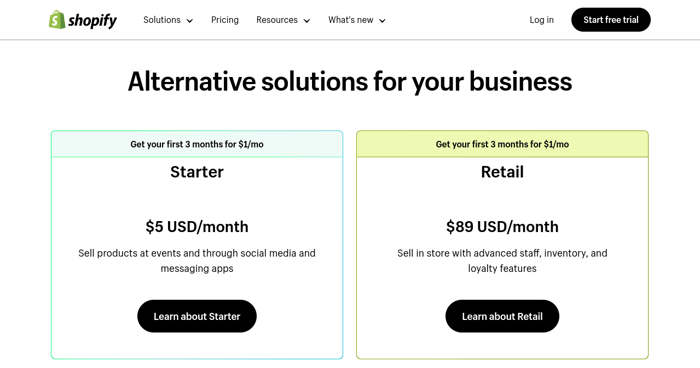
Shopify has created some additional pricing options to suit those who don’t want or need a full e-commerce plan. There is the Starter plan for a mere $5/month, which gives really small-scale businesses the ability to sell on social media platforms. This is an ideal option for many handicraft sellers or artisans.
Then there is the Retail plan for $89/month aimed solely at those with brick-and-mortar stores who don't need a detailed online storefront. You get a simple online store to manage inventory but also unlimited POS logins for staff.
Finally, Shopify Plus is the enterprise pricing option that can scale to fit any size business and is favored by some pretty big brands like Heinz, Tesla, and Decathlon. Pricing is customized to give you the features and sales capacity you need but starts at $2,000/month.
Volusion
Volusion offers three standard pricing options and one enterprise plan. Unlike with Shopify, each plan does have a set of strict limitations and feature differences.
There is also no free plan offered by Volusion but it’s comforting to know that, unlike Shopify, they do still offer a 14-day free trial. Another bit of good news is that Volusion doesn’t charge transaction fees for those using Stripe as their payment processor. If you choose a different third-party payment processor, you’ll be charged per sale either 1.25% on the Personal plan, 0.65% with the Professional plan, or 0.35% for those subscribed to the Business plan.
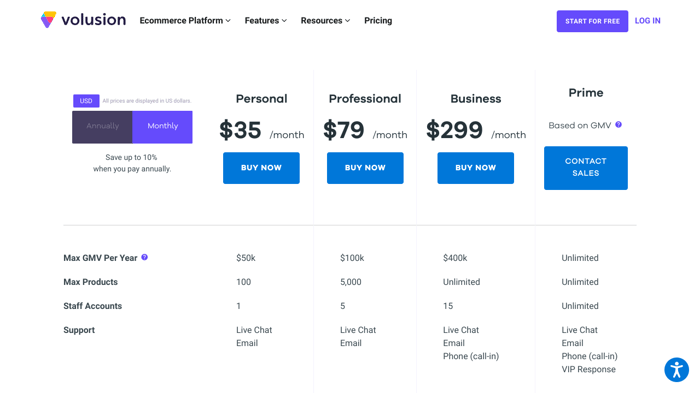
Personal Plan
The Personal plan is the starter option that allows you to build a basic e-commerce store but only allows one staff account. It costs $35/month or $378/year which works out to $31.50/month. You are limited to selling just 100 products and selling up to $50,000 worth of products in a year. If you surpass this, you’ll have to upgrade to the next pricing plan.
Professional Plan
The Professional plan allows you to sell significantly more products, up to 5,000, and bring in up to $100,000 in sales. You also get five staff accounts and abandoned cart reports, and you can display product ratings and reviews and develop newsletters. It costs $79/month or $853.20/year (equivalent to $71.10/month).
Business Plan
For $299/month or $3,229.20/year ($269.10/month), you can sell as many products as you like up to $400,000. You will also get 15 staff accounts to manage your sales. The Business plan also gives API access and the ability to make use of a customer loyalty program.
Prime Plan
Prime is the enterprise-level plan offered by Volusion. Pricing is customized and completely based on sales amount, but you get unlimited everything – and you can sell as many products as you like. Some of the perks of the Prime plan include a dedicated client success manager, low rates on other Volusion services, and exclusive access to new features.
Site Builder and Editor
How the site builder and editor work is a very important aspect for most people. In many cases, users have little to no experience in web development, so ease of use and drag-and-drop functionality are highly regarded. Other priorities include the design features and the ability to customize the look and feel of your store to match your desired brand.
Shopify
Shopify has been built with ease of use in mind. The dashboard isn’t pretty, but it’s functional and has more than enough features. The drag-and-drop style editor is a consistent crowd-pleaser and has the potential to turn almost anyone into a web design expert.
Another bonus to the Shopify site-building experience is the huge selection of themes to choose from. There are twelve completely free themes and just over 140 professionally designed paid themes. Prices for themes range from $150 to $380 on the upper end.
The editor allows you to make all the design changes, but any changes to the structure and content within your pages have to be done in a different dashboard, which can be confusing.
Volusion
Volusion also uses a drag-and-drop editor with different content blocks to build the professional-looking website you want. If you have the coding knowledge, you can edit the HTML and CSS code to your site – something that is much harder with Shopify because it uses a less common code language. Unfortunately, the editor dashboard is difficult to navigate and unnecessarily complicated.
On a positive note, Volusion promotes a 99.9% network uptime guarantee and provides mobile-responsive themes free of charge, but there are not very many to choose from. Twenty-three themes are comparatively slim pickings next to the options Shopify gives you.
The Verdict
The two site builders are similar – both offer a drag-and-drop editor and significant customization options. Shopify is easier to use, though; it simply has a more logical dashboard layout that users find cuts down on the learning time when you’re getting started. Volusion has probably just overcomplicated things by trying to pack too much in.
Volusion does offer themes for free, but there are not many to choose from. While you have to pay for the majority of the Shopify themes, there are tons of options.
Features
Features and functionality are a major deciding factor for many. There’s no point paying for a platform subscription if it doesn’t give you the ability to carry out the e-commerce activities you need.
Shopify
Almost all of the Shopify features are available to all pricing plan holders. All stores come with an SSL certificate to ensure a secure checkout that customers can trust. You can turn new customers into repeat, loyal customers with the use of gift cards and boost sales with the abandoned cart recovery tool. Customers will be reminded of an unfinished checkout process, and in many cases, it will lead to a successful sale.
Some of the new features added this year include a subscription app that allows you to take recurring payments or even accept pre-order payments.
To make running an e-commerce store much easier, Shopify gives you many e-commerce automations to lighten the load and streamline workflows. In addition, there are language translation and currency conversion tools for doing international business.
Volusion
Volusion also provides an SSL certificate to secure your site. A great feature is the simplified yet powerful inventory management system that allows you to automate purchase order requests. There are detailed website reports available and web design and marketing experts on hand for one-on-one consultation.
You can sell products in different currencies to make doing international business easy, and Volusion accepts a wide range of payment processors – you can even accept cash. It’s possible to create subscription-based payments and develop gift cards for customers. Volusion also allows you to calculate shipping rates for specific shipping options.
The Verdict
Shopify is so well-established that it’s a tight competition here, but Volusion actually offers quality built-in features. In particular, Volusion has top-notch, powerful analytics functionality and efficient inventory management tools. Shopify, in comparison, is heavily reliant on third-party integrations, which can end up costing you a lot of money.
Blogging
Adding a blog to your e-commerce store is a hugely valuable endeavor. Blogging improves SEO and can drive organic traffic and higher conversion rates – content marketing is a valuable tool for any e-commerce business.
Shopify
Shopify has a built-in blogging tool that provides reasonable functionality. It’s easy to use because it’s just there, but may not always give the best results. Shopify is primarily an e-commerce platform, so blogging on Shopify is a little like an afterthought. The URL structure is not SEO-friendly, and customizing your blog requires using Liquid code. This is not ideal, especially if you have zero coding ability.
One other interesting omission is the ability to add your products directly to blog posts, which would be a real bonus for an e-commerce store. This can only be done easily with the use of an integration.
For a professional-level blog that is content-heavy and gives you more SEO-friendly features, DropInBlog is a better option. It’s easy to integrate with Shopify, and it will automatically adopt the CSS of your store, so there will be no time wasted reformatting pages.
Volusion
Volusion, on the other hand, has no in-built blogging functionality at all. If you want to add a blog to your Volusion store, you’ll have to use a third-party integration. Suitable apps can be found in the app marketplace or you can integrate DropInBlog using the HTML integration method. Simply copy and paste a small section of HTML code and it’s done.
The Verdict
This one is pretty easy. Shopify wins hands down because it has in-built blogging functionality that Volusion lacks completely. If you wanted to use a separate blogging app like DropInBlog, Shopify is still better because it allows for easy integration of a blogging platform like DropInBlog.
Integrations
Integrations can sometimes be essential to getting even basic functionality with a platform. So, it’s important that the platform you choose has integration options available so that you can extend the functionality of your e-commerce store and continue to develop it.
Shopify
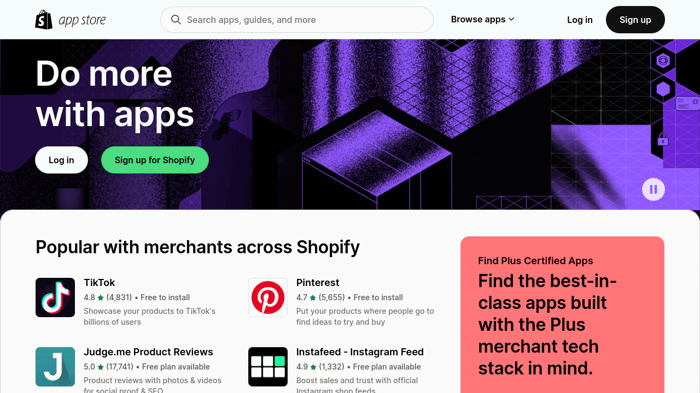
Shopify has a simply amazing app store. It’s easy to find what you want – and you can find almost anything. Apps are organized by use, so there’s a category for selling products, orders and shipping, marketing and conversion, store design, and more. Shopify has a direct DropInBlog integration, but you can also integrate with a range of other major platforms like:
Volusion
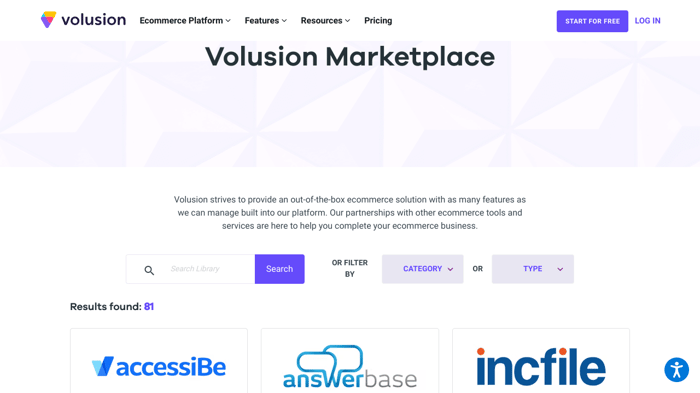
Volusion has an app marketplace and offers a reasonable range – about 80 apps – to expand the functionality of your e-commerce store. However, one main drawback is that the available integrations vary depending on your plan subscription. For example, if you’re on the Personal plan, you’ll only be able to integrate with social media platforms. Whereas the Professional plan and above have a much wider selection of integration options.
Some of the apps you can integrate with on the Professional plan and above include:
The Verdict
Both e-commerce platforms have their own app store; however, Shopify’s is more user-friendly and offers a lot more integration options than Volusion. The other downside to Volusion is the restriction on integrations on the lowest tier plan.
Customer Support
The level of customer support provided and the quality of that support can be a real deal breaker. When you’re paying good money for an e-commerce platform, you want to be sure you can get the help you need, when you need it.
Shopify
Shopify is renowned for providing high-quality customer support. 24/7 support is available to all plan holders. You’ll be able to reach their support team in a variety of ways, either through live chat, email, or over the phone.
If you don’t need to speak to a customer support representative specifically, then you can also find answers to your questions in the help center, community forum, or through any of their social media channels. There’s also the Shopify Academy, where you can find courses and learning materials to elevate your Shopify store.
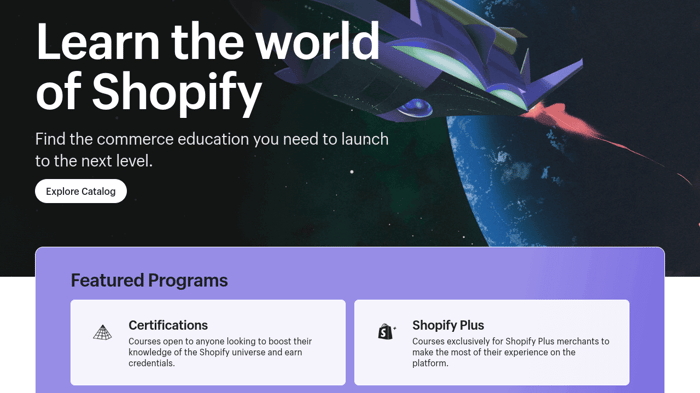
Volusion
Volusion offers customer support based on the plan you hold. For example, those subscribed to the Personal and Professional plans can get support in the form of live chat and email only. Business plan holders get additional phone support, and enterprise-level plan holders get the VIP response treatment.
Despite the restrictions in the mode of accessing support, the majority of customer feedback regarding the support is very positive. Of course, there are complaints from those on the lower-tier plans about the time it takes to receive a response, which is fairly typical where support is provided in this hierarchical manner.
The Volusion help center has a range of learning guides and webinars to get you started, but nothing on the level that Shopify has.
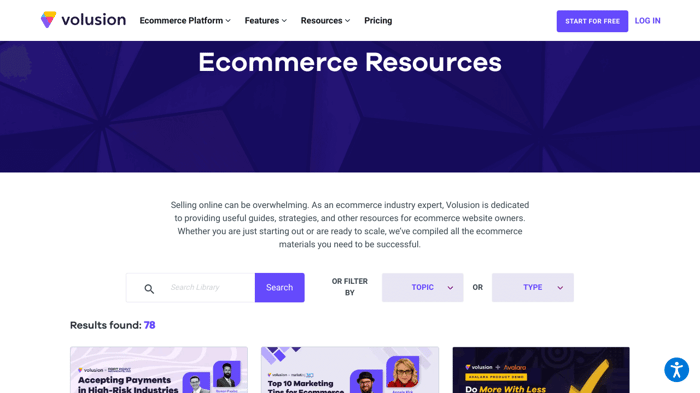
The Verdict
There aren’t many e-commerce platforms that could outdo the reputation Shopify has built in terms of customer support. Although Volusion customers report very little to be unhappy with, there are restrictions on the mode of support based on plan subscription, and response times can be a little slow. In contrast, Shopify offers all modes of customer support to all plan holders around the clock and a huge range of learning materials.
FAQs
Which is easier to use, Shopify or Volusion?
Shopify was built with ease of use as a priority, and it is easier to use than Volusion. Volusion has some perks, but many users complain about the platform being overly complicated and difficult to navigate.
What is the main difference between Shopify and Volusion?
Shopify and Volusion are fairly similar e-commerce platforms allowing users to build and manage an online storefront. Shopify and Volusion differ in pricing plan structure, customer support availability, blogging functionality, and themes.
However, a key difference between the two platforms is that Volusion does not allow you to sell digital products, whereas Shopify gives you the ability to sell any kind of goods or services.
Is Volusion any good?
Volusion has been around for a long time and certainly could fit the needs of many small to medium-sized business owners. It offers many built-in tools, in particular, analytics functionality, and the transaction fees are some of the lowest in e-commerce.
Volusion would be best for experienced e-commerce sellers who really want to get stuck into pouring over their site analytics and sales data.
Final Thoughts
Overall, Shopify is the clear winner in this Shopify vs. Volusion comparison. Sure, Volusion offers some features that Shopify does not, like the expert consultants on hand and detailed analytics as standard. But Shopify simply does better across the board.
Shopify and Volusion have comparatively similar pricing plans; however, Shopify presents greater value for money because of the features and functionality available at all levels. The Shopify site builder is easy to use, and there is a mountain of learning materials available online to manage your e-commerce business. When it comes to blogging functionality, Volusion lacks this entirely, whereas Shopify has a practical blogging tool or suitable integration alternatives.
In general, Volusion is also ideal for those with a small to medium-sized business that are solely looking to sell physical products. In contrast, Shopify is incredibly scalable and suitable for e-commerce businesses of all shapes and sizes, selling absolutely any kind of product or service. Shopify is so easy to use you can start your e-commerce journey with Shopify and grow with the platform along the way. It’s pretty clear that Shopify can’t be beaten in this instance.

